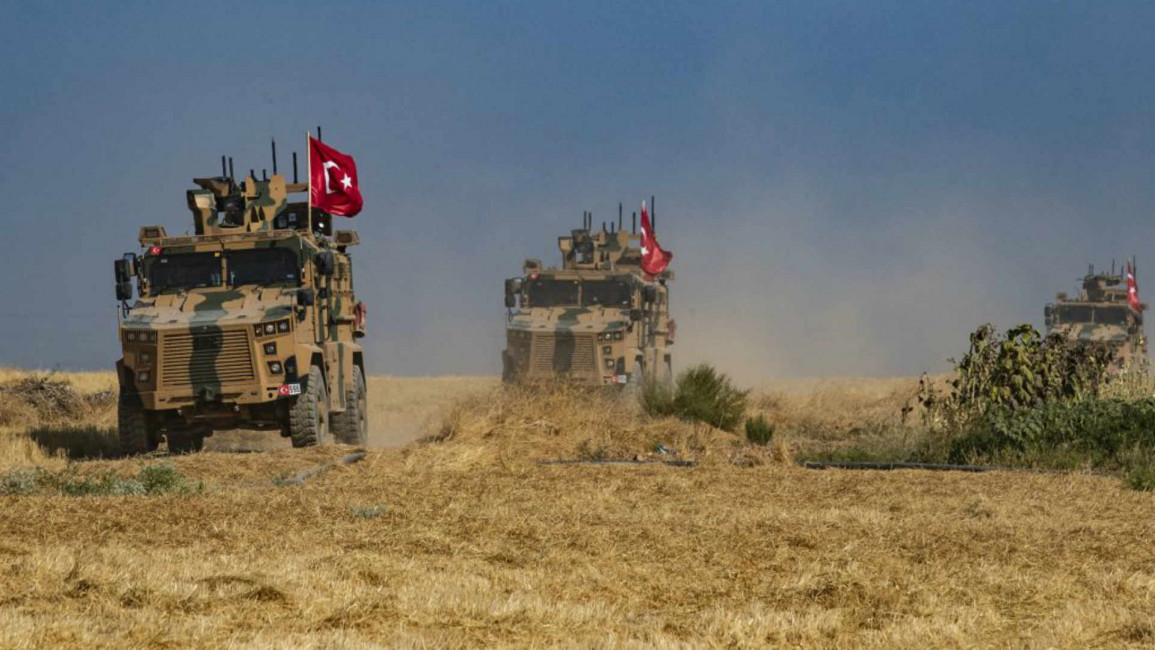
Syria's Kurds abandoned to a perfect storm of Turkish aggression and US isolationism
To be clear: the SDF is a front group dreamt up by Obama's state department to rather absurdly sidestep the fact that they were funding and militarily supporting the PYD and its armed wing the YPG, both of which are designated as "terrorist organisations" by the US' NATO ally, Turkey.
But now all that stands between the PYD and destruction at the hands of Turkey is Donald Trump. Even under the tenuous presumption that it was his desire to do so, it's difficult to know what Trump could do to stop Turkey from undertaking this military operation. But with the withdrawal of US forces from the Turkish border, it seems like the US won't even attempt to deter Turkey.
Trump has characteristically articulated his 'policy' on this question through a series of unlettered and contradictory tweets. The most telling of these came on Monday following a phone call with Turkish president Erdogan, with Trump tweeting that he had been elected on "getting out of these ridiculous endless wars", adding that "Turkey, Europe, Syria, Iran, Iraq, Russia and the Kurds will now have to figure the situation out".
Earlier, the White House had released a statement confirming the withdrawal of US troops from the area and announcing that Turkey would be going ahead with the military operation.
The only surprising thing here, is the naivety of the PYD and their supporters in believing the US would remain its ally in the face of Turkish aggression. If the Syrian war has proved anything, it's that the interests of different states will always trump the interests of people, regardless of ideology or ethnicity.
Russia's well publicised courtship of Erdogan, which forced the US to tread even more carefully on all matters relating to Turkey, combined with the isolationist and authoritarian agenda of Trump, means the outlook for the PYD's rule over North Syria is not looking good.
 |
If the Syrian war has proved anything, it's that the interests of different states will always trump the interests of people |  |
The incentives for Turkey to act are compounded by the racist intransigence of the EU to share the load when it comes to refugees. If not for Fortress Europe, radicalised even further by the rise of anti-immigrant, Islamophobic far-right governments and electoral forces across the continent, refugees could leave Turkey legally and safely. The hasty incentive for resettlement and the necessary Turkish war against the PYD in Northern Syria would be depleted.
But, as with most other elements of Syria, Europe isn't interested. And nor is xenophobic sentiment against refugees exclusive to the EU.
Though Turkey's acceptance of Syrian refugees has mostly been a shining light in the long dark genocidal war, there are signs that the welcome is wearing thin.
As a result, the popular incentive for Turkey to invade PYD-held areas of northern Syria and create what it calls a 'safe zone', which it claims will be capable of repatriating up to 3 million refugees, is huge.
Twitter Post
|
Not that this is Turkey's only motivation. It is of course, ideologically speaking, diametrically opposed to the Syrian wing of the separatist PKK. The Turkish obsession with stamping out Kurdish autonomy has led to decades of war with the PKK and is a major factor in its long-held will to cross the border and 'deal' with Rojava once and for all.
Many PYD supporters would claim that the refugee situation is simply a Turkish pretext for its general chauvinistic will to destroy Rojava as a Kurdish 'separatist' statelet on its border.
But this brings me back to schadenfreude or, as someone who has criticised the conduct of the PYD regarding the Syrian rebellion, lack of it. It's perfectly true that the PYD formed an unlikely pragmatic alliance with Assad early on in the Syrian war.
And it's perfectly true that this alliance created an ethnic rift where before there had been organic unity among Kurd and Arab in the north against the Assad dynasty - a dynasty that had long oppressed and ruthlessly repressed Kurds with a combination of racist policies and ruthless violence when Kurds rebelled.
However, the alliance was one of mutual pragmatism more than ideological harmony.
Assad withdrew his forces from Kurdish areas, freeing them to fight the rebellion, while the PYD could concentrate on building its statelet. As noted by the International Crisis Group at the time, the PYD denied access to Syrian rebel groups. This is why during the eight years of war in Syria, not one regime barrel bomb was ever dropped on Rojava.
From this point onwards, the relationship between the PYD and Syrian rebels unravelled drastically, and for the Syrian rebels, destructively so.
Playing on the pre-existing Islamophobia and anti-Arab racism in the West, the PYD successfully sold itself as a 'civilised' and 'westernised' alternative to the overtly Islamic and 'foreign' Syrian rebels.
Too often in western narratives, 'the Kurds' were fetishised as sufficiently 'western' enough to care about, while Syrians facing genuine annihilation were contrasted as backward Arabo-Islamic savages, prone to Al-Qaeda and Islamic State (IS).
 |
The Turkish obsession with stamping out Kurdish autonomy has led to decades of war |  |
Perhaps ominously for the PYD, the US was initially reluctant to lend them support during IS' siege of Kobani, though they eventually became the US' ground force in the fight against the 'caliphate'. The US had watched with disinterest as the Syrian rebels tried to fight both Assad and IS, but it wasn't until they began to threaten US regional allies and interests, as well as perpetrate attacks in the West, that they intervened.
But the casualties of this intervention were the Syrian rebels and millions of Syrians, who were either killed, maimed or cleansed. The rebels, like the PYD presently, were completely abandoned by the US. The Syrian revolution was left to be devoured by Assad, Iran and Russia.
It should come as no surprise that the US is willing to abandon its ally when it faces destruction at the hands of Turkey. Though it might be dismissed as utopian in light of the distance between rebels and Kurdish forces, there were flashes of unity during the war.
 |
As with most other elements of Syria, Europe isn't interested |  |
When IS attacked Kobani, the first non-Kurdish force to respond was the FSA. In the early days of defending Raqqa, when it looked like a rebel victory was possible, Kurdish forces formed Jabhat al-Akrad as a brigade of the FSA to fight Assad and IS.
It's these moments of unity between the oppressed that should have been the rule as opposed to the exception.
Instead, as with those suffering from Assad and Russia's genocidal reconquista in Idlib, the people in north Syria now find themselves alone and dependent on self-interested state forces.
Just as the presence of jihadist forces in Idlib doesn't justify the genocidal war being waged there, it doesn't matter what the PYD previously did and who they allied with. The ultimate reality is that any Turkish attack on PYD-held areas will be one more horror in the totality of tragedy that has engulfed Syria.
The last thing Syria needs is more war.
It will be real people, not factions, groups or fetishes, who suffer.
Sam Hamad is an independent Scottish-Egyptian activist and writer.
Join the conversation @The_NewArab
Opinions expressed in this article remain those of the author and do not necessarily represent those of The New Arab, its editorial board or staff.



